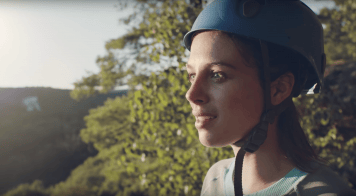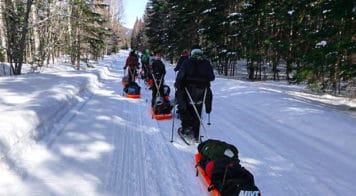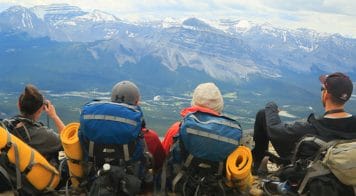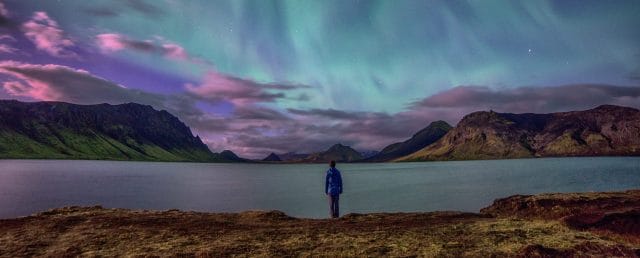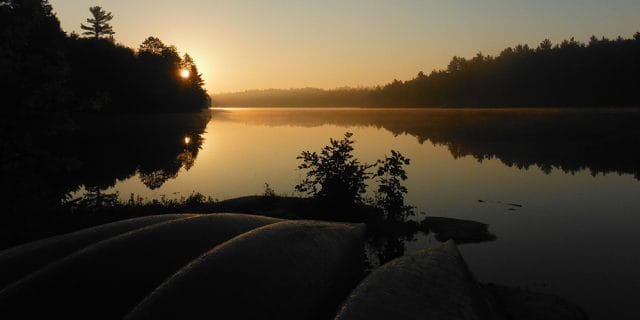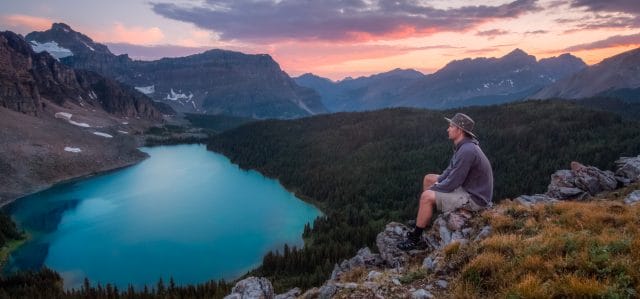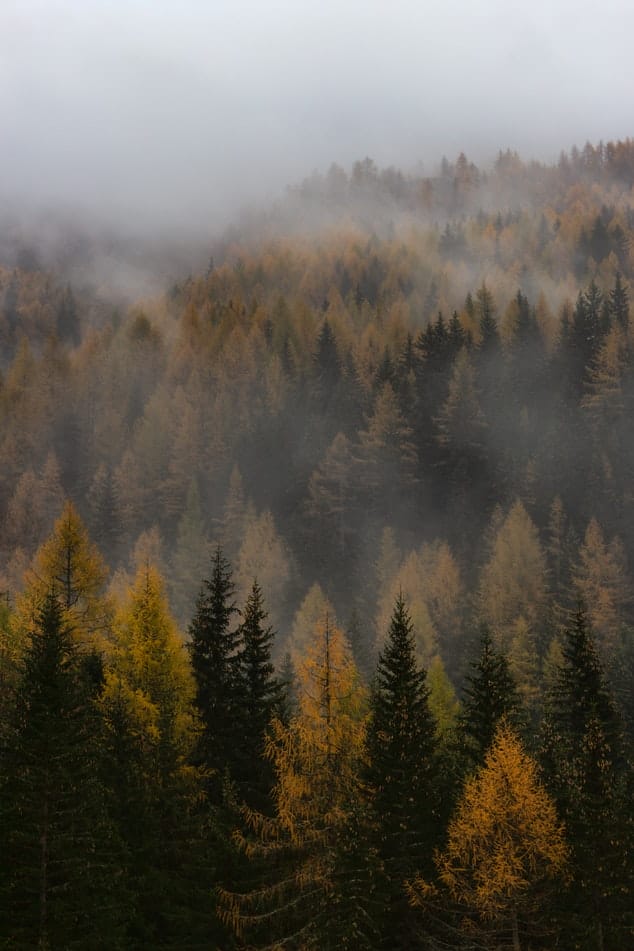The power of representation: Shams Ben Temessek’s Experience as a BIPOC woman in the outdoor industry
As the world celebrates International Women’s Day, we honour the extraordinary women who inspire and empower others. Among these trailblazers are instructors who courageously introduce others to the wonders of the great outdoors. The OBC instructor Shams Ben Temessek is one of these amazing women.
In the following interview, Shams shares her inspiring journey, from growing up with no outdoor experience to discovering her passion for nature, and eventually becoming an outdoor guide. Her story is a testament to the transformative power of nature and the remarkable accomplishments that can be achieved through hard work and determination. Thank you, Shams, for being such an inspiration and helping underrepresented women and girls see themselves in outdoor spaces!
1. What brought you to Outward Bound?
I didn’t grow up in the outdoors. My parents came from Tunisia, where the relationship with “the outdoors” is quite different than in Canada. Not better or worse, just different. For them, “being outdoors” meant going to the beach or playing soccer outside in a field. Not sleeping on the ground, with no wifi access, and “getting eaten by a bear,” as they like to say. For my Tunisian parents, camping was something you did out of necessity and poverty, not a leisure activity.
So, the first time I went camping I was 18 and it changed my life. I knew I wanted to do more of it. Fast-forward a couple of years later, I got a scholarship from NOLS for a BIPOC rock-climbing course in Arizona. For the first time in my life, I saw People of Colour guiding professionally. I had never thought I could aim to become an outdoor guide!
I had never seen anyone in this position that looked like me, and I had no idea how to get started. It was so helpful to get their insight! They recommended I look into Outward Bound Canada, and that same summer I worked first with the Vancouver Urban and then with the West Coast Chapter!
What brought me to OBC was the fact that the expeditions focus on connecting with nature rather than the more common “go hard or go home” approach. OBC uses sea kayaking, canoeing, or hiking as a medium to connect with the outdoors, and the experience focuses on trying something new at your own pace.
2. Can you tell us more about the feeling of seeing People of Colour guiding professionally for the first time, and how it helped you realize you could guide too?
It’s hard to imagine becoming something you didn’t even know was possible. At the time, becoming an outdoor guide sounded as foreign as becoming an astronaut. I had only seen guides who were white and had been canoeing or kayaking as a child, while my friends and I growing up had never even been to a summer camp or kayaked.
3. We’d love to hear more about your experience as a BIPoC female outdoor instructor, e.g. what is the best part, what are the biggest challenges?
It can be a bit discouraging when I look at outdoor organizations I’d love to work with and see that they only have white staff, or when people keep talking about gender parity in the outdoor industry but what they seem to mean is 50% white men and 50% white women, without opening the discussion to other types of diversity. I’d like to see these conversations shift to an intersectional perspective and talk specifically about women of color, trans women, and body-type diversity.
The best part about being a BIPOC female outdoor instructor is knowing that I can bring in my own experience and see things from a different perspective. That’s why I love working with BIPOC affinity groups or with urban groups.
4. What was your first experience with OBC? Did you take a course as a participant before becoming an instructor?
I had done one contract with OBC before participating in the Training Academy. This free program facilitated by Outward Bound to train a new generation of outdoor guides was three-week long and pivotal in my outdoor journey.
During the first two weeks, we had classes on Mount Washington on mental health first aid, trauma-informed therapy, and Indigenous reconciliation, among others. The program culminated in a week-long canoeing and sea kayaking expedition.
It was so helpful to connect with people in the field during Training Academy and have access to training without having to spend thousands of dollars – which is such a high barrier!
5. What do you like best about being an OBC instructor?
I love being part of a worldwide organization! I’ve had people ask me about my Outward Bound water bottle and when I told them I was a guide, they told me – with stars in their eyes – about a life-changing Outward Bound trip they took in 1978 in Maine or in New Zealand when they were 18. OBC also provides a lot of training which helps me grow as an instructor.
6. What about your favourite part of the course experience with students?
I ask in all my courses for students to use what’s around them during their solo experience to make a gift for someone else – Secret Santa style. It always amazes me what people come up with and the sheer creativity everyone shows. I also love watching the students’ growth during their “Final,” when they are encouraged to be the leaders for the day. It’s inspiring to see how much they’ve learned in such a short amount of time.
7. What advice would you give to other women who want to start a career in the outdoor industry?
Starting a career in the outdoor industry is expensive because of all the certifications and gear needed. It can also be hard to get “that first” work experience in the outdoors. So I would say to do a deep dive as to what free/subsidized opportunities are around you. There are more and more subsidized women kayak paddles and even free opportunities like OBC’s Training Academy or programs like Mountain Mentors in BC, where women get paired with a mentor for skiing, snowshoeing, or mountain biking throughout the season. The Summit Scholarship is open to women applicants from around the world, and gives scholarships for mountaineering training to help break down barriers.
Another advice would be to apply for grants like the RBC Future Launch, which is a $1,500 grant for completing non-university training for a new career. I used this grant last summer to get a sea kayaking certification. Also, even if an organization doesn’t say it offers scholarships, send them an email to ask about it! You might very well make them realize they need to offer scholarships and start a discussion there.
8. So, how do your parents feel about you working as an outdoor instructor now? Do they support you?
It’s definitely been a journey! My parents are now supportive, having seen how excited I am to be an outdoor guide. They still have never camped out – but I’m working on it!
9. With this in mind, what would you say to other first-generation Canadians or newcomers who have no family or cultural tradition in the outdoors and want to get their family to support their decision to become an outdoor guide?
At the end of the day, resentment doesn’t change the heart of others- only yours. It’s your life and it’s worth fighting for.
10. Why is OBC important?
I believe the most profound learnings come when you’re out of your comfort zone. Put a bunch of people that have never met, in an environment they’ve never been in, doing an activity they’ve never done, or at least definitely not at that intensity, and magic happens.
Just as Meg Jay, a clinical psychologist – who funny enough was an Outward Bound instructor – mentions in her book The Defining Decade: “Confidence doesn’t come from the inside out. It comes from the outside in.” People feel less anxious – and more confident- on the inside when they can point to things they have done well on the outside.”
Outward Bound is also so important for giving scholarships and financial aid to people who otherwise wouldn’t be able to participate in a course. If you’re reading this, and you’d love to come on a course but can’t afford it: Apply, apply, apply! I can vouch for my own experience about the impact of expedition courses and the importance of seeing yourself represented. I believe that by giving more opportunities to women, including women of colour, we not only make them more comfortable in their own skin, and braver, but we also make a better world. Happy International Women’s Day, everyone!
ABOUT THE INTERVIEWEE
Shams currently works as an outdoor guide with Outward Bound Canada in the Vancouver urban chapter and in the West Coast chapter. She currently calls the North home and lives in Whitehorse, where you can find her in her spare time building a new shelf, upcycling inner bike tires into pencil cases, or looking at clouds.
